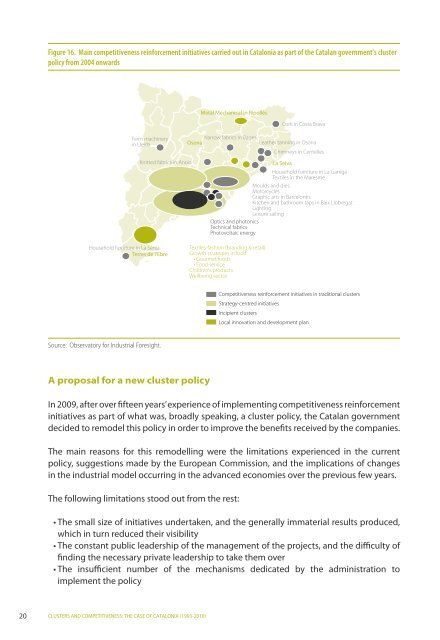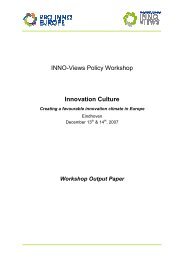Clusters and competitiveness - PRO INNO Europe
Clusters and competitiveness - PRO INNO Europe
Clusters and competitiveness - PRO INNO Europe
You also want an ePaper? Increase the reach of your titles
YUMPU automatically turns print PDFs into web optimized ePapers that Google loves.
Figure 16. Main <strong>competitiveness</strong> reinforcement initiatives carried out in Catalonia as part of the Catalan government’s cluster<br />
policy from 2004 onwards<br />
Farm machinery<br />
in Lleida<br />
Knitted fabrics in Anoia<br />
Household furniture in La Sénia<br />
Terres de l’Ebre<br />
Source: Observatory for Industrial Foresight.<br />
A proposal for a new cluster policy<br />
20 CLUSTERS AND COMPETITIVENESS: THE CASE OF CATALONIA (1993-2010)<br />
Metal Mechanical in Ripollès<br />
Cork in Costa Brava<br />
Narrow fabrics in Bages<br />
Osona<br />
Leather tanning in Osona<br />
Chimneys in Centelles<br />
La Selva<br />
Household furniture in La Garriga<br />
Textiles in the Maresme<br />
Moulds <strong>and</strong> dies<br />
Motorcycles<br />
Graphic arts in Barcelonès<br />
Kitchen <strong>and</strong> bathroom taps in Baix Llobregat<br />
Lighting<br />
Leisure sailing<br />
Optics <strong>and</strong> photonics<br />
Technical fabrics<br />
Photovoltaic energy<br />
Textiles-fashion (br<strong>and</strong>ing & retail)<br />
Growth strategies in food:<br />
• Gourmet foods<br />
• Food service<br />
Children's products<br />
Wellbeing sector<br />
Competitiveness reinforcement initiatives in traditional clusters<br />
Strategy-centred initiatives<br />
Incipient clusters<br />
Local innovation <strong>and</strong> development plan<br />
In 2009, after over fifteen years’experience of implementing <strong>competitiveness</strong> reinforcement<br />
initiatives as part of what was, broadly speaking, a cluster policy, the Catalan government<br />
decided to remodel this policy in order to improve the benefits received by the companies.<br />
The main reasons for this remodelling were the limitations experienced in the current<br />
policy, suggestions made by the <strong>Europe</strong>an Commission, <strong>and</strong> the implications of changes<br />
in the industrial model occurring in the advanced economies over the previous few years.<br />
The following limitations stood out from the rest:<br />
• The small size of initiatives undertaken, <strong>and</strong> the generally immaterial results produced,<br />
which in turn reduced their visibility<br />
• The constant public leadership of the management of the projects, <strong>and</strong> the difficulty of<br />
finding the necessary private leadership to take them over<br />
• The insufficient number of the mechanisms dedicated by the administration to<br />
implement the policy
















